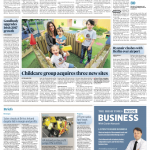Mark Coughlan is one half (with Gavin Sheridan) of the team behind TheStory.ie. The site is dedicated to sharing documents and information to promote transparency in public life and represents a new media hybrid between traditional investigative journalism and crowdsourcing.
The site has been referenced on numerous occasions by national newspapers and is an indispensable resource for primary sources on government information. Mark is is a 22 year old freelance journalist and researcher from Dublin. He has worked for various media outlets in Ireland and has been published in several of national and regional newspapers. He also writes analysis for Irishelection.com.
What do you consider to be your biggest success since starting The Story?
The work we’ve done on Enterprise Ireland figures, and freeing information about expenses.
The Story is a free site that has the potential to scoop the mainstream press on their most sellable headlines. Is The Story potentially destructive to other media as a competitor? Are sites like The Story a threat to professional journalism?
Well myself and Gavin are both “professional” journalists, in the sense that we’re both paid to work by media outlets. So, by my own definition TheStory.ie would be part of, as opposed to a threat to, professional journalism.
Competition in the media is a good thing but it should not, in a purist’s eyes, be a commercial thing. The competition should be for the best stories – those which are of the most societal import – not for the sellable stories. Sellability, if that is a word, is a by-product of good journalism, not something that journalists should look for in an article. Therefore our site just slips into the “mediasphere” in the same way a niche magazine or alternative newspaper does.
I don’t see us as a threat to “regular” journalism, rather a compliment. We don’t have the resources to “compete” for stories with most of the newspapers because we’re just two heads, so instead we’re following a few specific lines. However, because we don’t have to compete for stories either it allows us to concentrate on a small number of important, long-term, lines. Another advantage we have is in our lack of deadlines – we can continue looking further into stories without having to worry about writing a few thousand words of copy by 6pm or have a 5 minute package done by Xpm.
“Destructive” is perhaps the wrong word. “Disruptive” I’d say, would be more apt. Sites like ours can disrupt the activities of the broader media, you just have to look across the water at the impact Guido Fawkes, ConservativeHome and the likes have had on consensus opinions in the UK. I’m not saying that example is a positive but… maybe Slugger up North would be. A disruption is often a good thing. I think of it like pruning trees… I don’t think TheStory in itself is destructive, the internet is disruptive to mainstream media, but in a positive way. The internet will facilitate far better journalism than the type that exists today. Infinite space, infinite time… the golden age starts today.
The nature of the information on The Story means an investment on your part to get documentation under the Freedom of Information act as well as an investment in your time. Are the goodwill and the donations of the public enough to sustain The Story and would commercialising the site risk damaging perceptions of its objectivity?
The donations are enough to sustain us over the next few months as we give our time for free. That’s enough for myself and Gavin for the time being. We both have regular work elsewhere so giving our time for free to something we believe is worthwhile is something we can afford to do, thankfully. If work did dry up for us elsewhere maybe we’d have to review. If that did happen I don’t see a issue, on the face of it, with accepting some form of sponsorship of our work from a commercial organisation. We would have to weigh up the options carefully, we’d be wary of accepting monies from a government body or one of the unions for example. But if mid-sized tech company or something wanted to sponsor what we did – banner ads or something – and the alternative was to stop, or severely curtail the consistency of the posts, we’d probably consider it. Luckily we’re not near that point yet.
What do you find are the biggest obstacles to researching the news on The Story?
Time and the FOI system. If we had more time to research, well, we’d do more research. If the FOI system was better designed and better implemented, we’d run more stories. Oftentimes our requests are delayed or simply not replied to, for weeks.
How answerable are sites like yours compared to the accountability of traditional press?
If someone feels something is wrong with what we’ve published they can leave us a comment which we’ll publish right beneath the article. If they have issue with the press they can write to the editor and, if they’re lucky, they might get a clarification in the corner of a page deep inside an edition a few days after the article has run. Furthermore we can make corrections to the articles at any point, once something is in print there’s no going back… if something needs to be edited on a website it can be done months or years later. Not so in a newspaper. Even less rarely in broadcasting where clarifications or corrections are an extreme rarity.
In legal terms, what we write is subject to the same laws as any media organisation. Regards accountability, if we write something that is false or poor our readers will be the first to let us know – in big comments right under the post – you don’t build a trusting audience by printing falsities all the time. If you’re audience doesn’t trust you, as a journalist, you’re not in great shape. Your audience is often also your source. So often just having an audience informed on the issues about which you write – which, judging by our email subscription list, we seem to – ensures you stay on we stay on our game. Comments saying “you got that basic fact wrong, you twat” don’t look pretty right below your 1000 word article. Thus, we try to avoid giving someone that opportunity (though we publish all comments unless they’re – or are potentially – libelous).
Do you find that data on The Story is forming the basis of many articles in the traditional press? Do they cite you as a source?
The Sunday Tribune ran a double page spread on expenses data we made public. They cited us a few paragraphs down in the copy and under the “league table” of expense claimants. They’ve run a few articles citing us as a source, which is fair and we appreciate. Similarly, to a somewhat lesser degree, with the Sunday Times and Daily Mail. Prime Time used some of our data and showed the website on screen, the Six One news did the same. It’s more difficult to overtly cite a source in print than broadcast so that was appreciated. Overall, we can’t complain, blogs, broadly speaking, still aren’t an “acceptable” media to source in Ireland – unlike Talking Points Memo, ProPublica etc in the States – so we’re careful to ensure we hold ourself to the high standards to build a reputation as an acceptable media to cite.
Iceland has recently decided that it will put in place the most liberal press legislation in the world in a bid to boost their economy by attracting publishers and other content producers. Is there an economic benefit to a more liberal press regime and do you see publishers being attracted by this? What can Ireland do to take advantage?
Publishers will be attracted, of course, it’s a great development for free press. The economic benefits; I haven’t looked at them yet, I’d presume the new laws would have to come with changes in taxation policy on media organisations and/or publishers, or some such. Before Ireland could consider doing anything to take advantage of any economic development from improving press freedom it should consider implementing basic legislation to protect whistleblowers, bring the Gardai under the FOI act and lower/abolish the fee for FOI requests. Maybe Irish publishers could take advantage by moving their HQ to Iceland…
Are the government and state agencies treating your site with the same deference and respect as they would traditional media?
The Government and state agencies don’t really have a choice but to treat us with the same respect as any other enquirers, they just follow the procedures. Deference is a whole ‘nudder thing, I don’t think the Government or agencies treats any media with deference, it’s often the reversal actually. It’s sources that treat us differently – calling someone and saying “Hi, this is Mark from TheStory.ie” gets, understandably, a more wary reaction from sources than being able to call and say “Hi this is Mark from The Irish Times”, as people are more aware of the Times and the standards of journalism to which is holds itself. For that reason it’s useful when respected newspapers cite us as a solid source, we need it to help build our reputation. But Government and State agencies, nah, no special – positive or negative – treatment really.
What’s next for The Story?
We’ve a few long-term stories we’ve been working on that we plan to publish in the next few months and a few things that should help others do something similar in other areas that we plan on launching soon too. After that, who knows…





